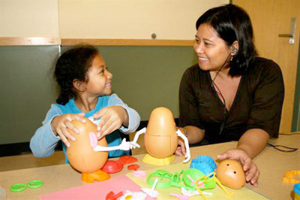Case Management
 Case management helps provide an array of services to individuals and families in order to cope with complicated situations in the most effective way possible. The goal is to achieve a better quality of life. The consumer identifies their goals, needs, and resources. From that assessment, the case manager, consumer and family come up with a plan to meet those goals. The case manager helps consumers to find resources and gets them connected with other services. Sometimes she or he advocates on behalf of a consumer to obtain needed services, and checks with the consumer to make sure their goals are being met.
Case management helps provide an array of services to individuals and families in order to cope with complicated situations in the most effective way possible. The goal is to achieve a better quality of life. The consumer identifies their goals, needs, and resources. From that assessment, the case manager, consumer and family come up with a plan to meet those goals. The case manager helps consumers to find resources and gets them connected with other services. Sometimes she or he advocates on behalf of a consumer to obtain needed services, and checks with the consumer to make sure their goals are being met.
Family Therapy
 Family therapy views a person’s symptoms as taking place in the larger context of the family. Family Therapists help family members find constructive ways to help each other. The therapeutic process seeks to find ways to acknowledge the value of families and other relationships. Emphasis is placed on respecting each others perspectives, beliefs, views and stories. The therapist uses the goals in the treatment plan to support change with individuals, but also in the relationships in the family and support system.
Family therapy views a person’s symptoms as taking place in the larger context of the family. Family Therapists help family members find constructive ways to help each other. The therapeutic process seeks to find ways to acknowledge the value of families and other relationships. Emphasis is placed on respecting each others perspectives, beliefs, views and stories. The therapist uses the goals in the treatment plan to support change with individuals, but also in the relationships in the family and support system.
Individual Therapy
 Individual therapy begins with the therapist and consumer getting to know each other. Through this initial meeting a pattern of thinking and behaving emerges that allows the clinician to understand the individual’s methods of responding to their world. Sometimes these patterns can be associated with a common diagnosis such as depression, anxiety, or PTSD. Substance abuse issues are addressed with a philosophy of recovery oriented service delivery. An effective course of action, or Treatment Plan, can be constructed from an understanding of these patterns. Because each person is unique, the therapeutic process is individualized for each person and the issues for which they are seeking relief. The treatment plan is the road map of what will be addressed during therapy. For some, it may be increasing their knowledge of where their struggle began. For others, it may mean discovering a way to address a problem at home, in relationships or even at work.
Individual therapy begins with the therapist and consumer getting to know each other. Through this initial meeting a pattern of thinking and behaving emerges that allows the clinician to understand the individual’s methods of responding to their world. Sometimes these patterns can be associated with a common diagnosis such as depression, anxiety, or PTSD. Substance abuse issues are addressed with a philosophy of recovery oriented service delivery. An effective course of action, or Treatment Plan, can be constructed from an understanding of these patterns. Because each person is unique, the therapeutic process is individualized for each person and the issues for which they are seeking relief. The treatment plan is the road map of what will be addressed during therapy. For some, it may be increasing their knowledge of where their struggle began. For others, it may mean discovering a way to address a problem at home, in relationships or even at work.
Interactive Therapy
 Interactive therapy is a treatment method typically used with children. The session generally involves interaction with the therapist during which the child can play out internal conflicts and distress regarding a variety of problems. Younger children do not have the verbal skills to discuss issues and communicate their emotions. By utilizing play, children feel more empowered by interacting on their terms in an environment that is comfortable for them. During the therapeutic session children are the directors of their environment.
Interactive therapy is a treatment method typically used with children. The session generally involves interaction with the therapist during which the child can play out internal conflicts and distress regarding a variety of problems. Younger children do not have the verbal skills to discuss issues and communicate their emotions. By utilizing play, children feel more empowered by interacting on their terms in an environment that is comfortable for them. During the therapeutic session children are the directors of their environment.
Marriage Therapy
 There are many problems affecting families and couples today; adolescent and child behavioral problems, emotional difficulties, or the acting out of past family patterns that are difficult to break. The support for couples and families has changed dramatically over the last decade. Families of all sizes turn to marriage and family counseling to help sort through their often overwhelming daily obstacles. Marriage and family counselors treat individuals within the context of their relationships. By dissecting the family structure, a marriage counselor or family therapist can evaluate where the difficulties lie and establish a plan for resolution.
There are many problems affecting families and couples today; adolescent and child behavioral problems, emotional difficulties, or the acting out of past family patterns that are difficult to break. The support for couples and families has changed dramatically over the last decade. Families of all sizes turn to marriage and family counseling to help sort through their often overwhelming daily obstacles. Marriage and family counselors treat individuals within the context of their relationships. By dissecting the family structure, a marriage counselor or family therapist can evaluate where the difficulties lie and establish a plan for resolution.


